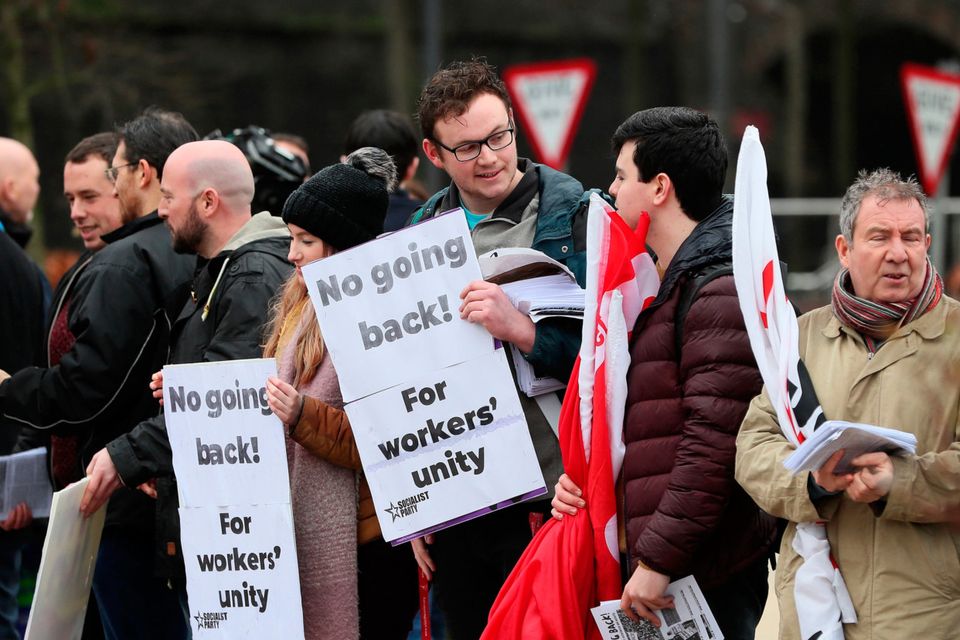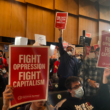Statement by the Socialist Party
News broke on Wednesday night of the attempted killing of a police officer in Omagh. He was shot multiple times by masked gunmen after a youth football coaching session. Early reports suggest this was likely an attack carried out by the dissident republican “New IRA”. Such attacks are a scourge on working-class people’s lives and a blatant attempt to inflame sectarian tensions.
Community in shock
The brutal nature of this attack; carried out in front of children, young people and parents at a sports complex, has undoubtedly sent shockwaves through Omagh, a town that has suffered many atrocities and is still impacted by the Omagh bomb in 1998. It is a chilling reminder of the potential for a resurgence of sectarian violence on the streets of Northern Ireland. The callous nature of this attack put at risk the lives of young people in the vicinity, some of whom could easily have been killed. Additionally, the trauma from witnessing such an attack can have lifelong consequences, not just on those directly affected but on entire communities. To have public spaces such as leisure or sports centres, meant to be safe places for young people and others, threatened in this way is despicable.
In our schools, colleges, workplaces and communities, we must now respond to this escalation. In recent weeks, working-class people have united on picket and joined protests in towns and cities across the North, calling for fair pay and standing in defence of public services. We have stood against transphobia, homophobia and misogyny in our thousands at protests and vigils in Lurgan, Belfast and Derry – most recently following the brutal murders of Natalie McNally and Brianna Ghey. Young people from both communities are to the fore of these struggles. Now we must unite against sectarianism and say: “No going back!” Omagh Trade Union Council has called a protest for Saturday 25 February, 11:30am, at Omagh Courthouse. This is an opportunity to take all of the anger and outrage we feel at oppression, exploitation and sectarianism, which are all part and parcel of the capitalist system, and build a movement to push back against those who seek to drag us back.
No going back
Attacks such as this are an attempt by paramilitary organisations to drag our society back to sectarian conflict. Working-class people were forced to endure gross state repression and sectarian attacks and violence during the Troubles. Dissident republicans aim to provoke a backlash from the state and the loyalist paramilitaries, hoping that a re-ignition of open sectarian conflict and increased repression in Catholic communities will create an environment in which they can grow and prosper. Some loyalist paramilitaries seek the same outcome. The withdrawal of support for the Good Friday Agreement (GFA) by the loyalist paramilitaries over the Brexit protocol crisis, and the warnings that already a younger generation of loyalists have been recruited and are barely being held back from a return to sectarian violence, illustrates the real dangers in this situation.
As we approach the 25th anniversary of the GFA the limitations of the “peace process” are becoming more apparent: communities remain deeply divided, the promised peace dividend has not been delivered, paramilitaries continue to operate on both sides and the political establishment relies on the continuation of sectarian division. Instead of bringing the communities together and overcoming the conflict of national identity, the GFA has served to institutionalise sectarianism. There are more ‘peace walls’ now than during the Troubles. In the Catholic community a sense of alienation is increasing from the NI state and Britain and feel a continuation of a denial of their rights, made worse by Brexit. Likewise the Protestant community fear there is a drift towards a united Ireland, where they fear they would be discriminated against and that the Protocol is the breaking of the link with Britain. Now, given the deep economic, social and political crises here and internationally the conflict of national aspirations is becoming more acute. This underlines why there is an urgent need to build united movements that can fundamentally transform our society, eradicating the basis for division, exploitation and oppression.
Stormont is culpable
The politicians in Stormont have condemned the attack. They even released a joint statement. But such words are empty while they bear responsibility for ensuring the maintenance of the economic and social conditions required for the growth of these organisations. It is not a coincidence that the dissident republicans are able to grow in the most hard pressed working-class Catholic areas. These are working-class areas that have been left behind by the peace process. Derry City and Strabane Council reported the lowest employment rate (61.6%) and the highest inactivity rate (34.1%) in NI. This is mirrored in Protestant working-class areas, which also rank high in terms of unemployment and deprivation, and it is in areas like this that the loyalist paramilitaries have attracted younger people to their ranks. This is not accidental but a product of the Executive’s capitalist, pro-austerity politics. The reliance of the Stormont parties on sectarian division is clear. They have refused to fund integrated education and openly beat the sectarian drum when required. These conditions provide fertile ground for paramilitarism to grow.
Only working class can challenge sectarianism
Only working-class and young people, united across the sectarian divide, have the power to challenge these organisations. The dissident groups have little support. Their desire to bring a return to sectarian violence means that they are treated with disdain by most working-class people. In the aftermath of the killing of Lyra McKee – a young journalist – in 2019, many thousands of young people took to the streets to demonstrate their disgust. Vigils organised by the National Union of Journalists (NUJ) attracted significant crowds of working-class and young people, bringing an immense pressure to bear on Saoradh (the political wing of the New IRA), which temporarily drove them back. They called off their Easter Monday parade in Derry and other dissident republican groups even openly criticised the New IRA and called on it to end its armed campaign.
In the 1990s, a series of strikes and large demonstrations against sectarian killings and bombings played a key role in forcing the paramilitaries on both sides to declare ceasefires. When postal worker Danny McColgan was shot dead by loyalist paramilitaries in 2001, it was the mass action by postal workers and the wider working class which succeeded in forcing loyalist and republican paramilitaries to lift the threats against workers. Over 100,000 workers demonstrated on January 18th 2001 in one of the biggest ever protests seen in Northern Ireland.
At a time when thousands of workers in Northern Ireland are striking for better pay, we stand united on the picket line. Such unity must be expanded to show our opposition to sectarian attacks. So far the response of the Irish Congress of Trade Unions has been meek. They have condemned the shooting and correctly point to the power of workers on recent picket lines. They should now organise seriously to mobilise the power of their 250,000 members, Protestant, Catholic and other, to isolate and undercut sectarian forces. Working-class people and the trade unions are the most powerful force in society and have the capacity to push back the forces of sectarianism. We must do so on the streets but also, crucially, politically. The politicians in Stormont bear responsibility for the sectarian division in our society. We must begin to build a mass working-class political party that challenges them. A united political voice for all working people, with a programme to end poverty and to provide decent jobs. Such a party would be capable of overcoming the sectarian division which blights the lives of working-class people through a united struggle for a socialist future, and once and for all consigning the past to the past.
Now is the time to get involved – talk to us about how you can be part of building an active movement against sectarianism.












